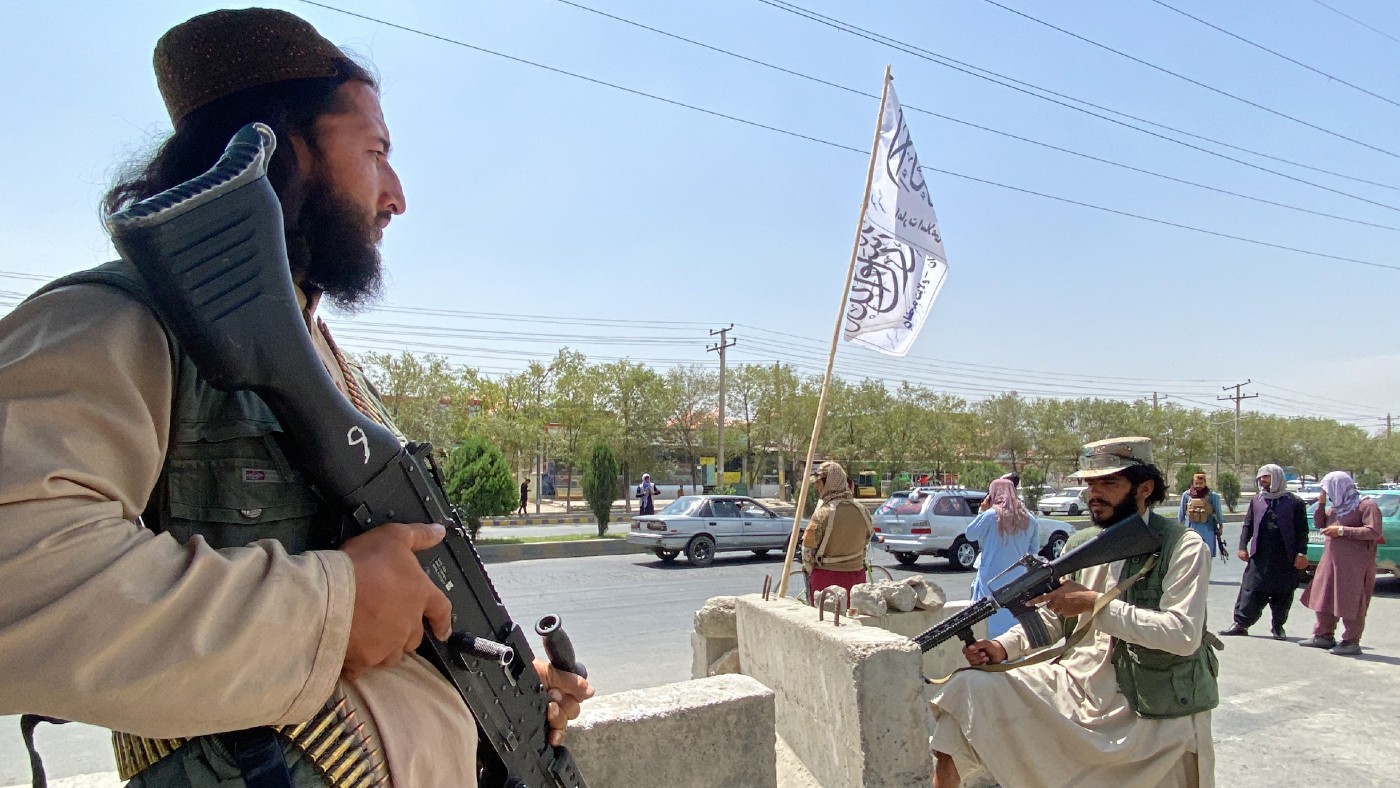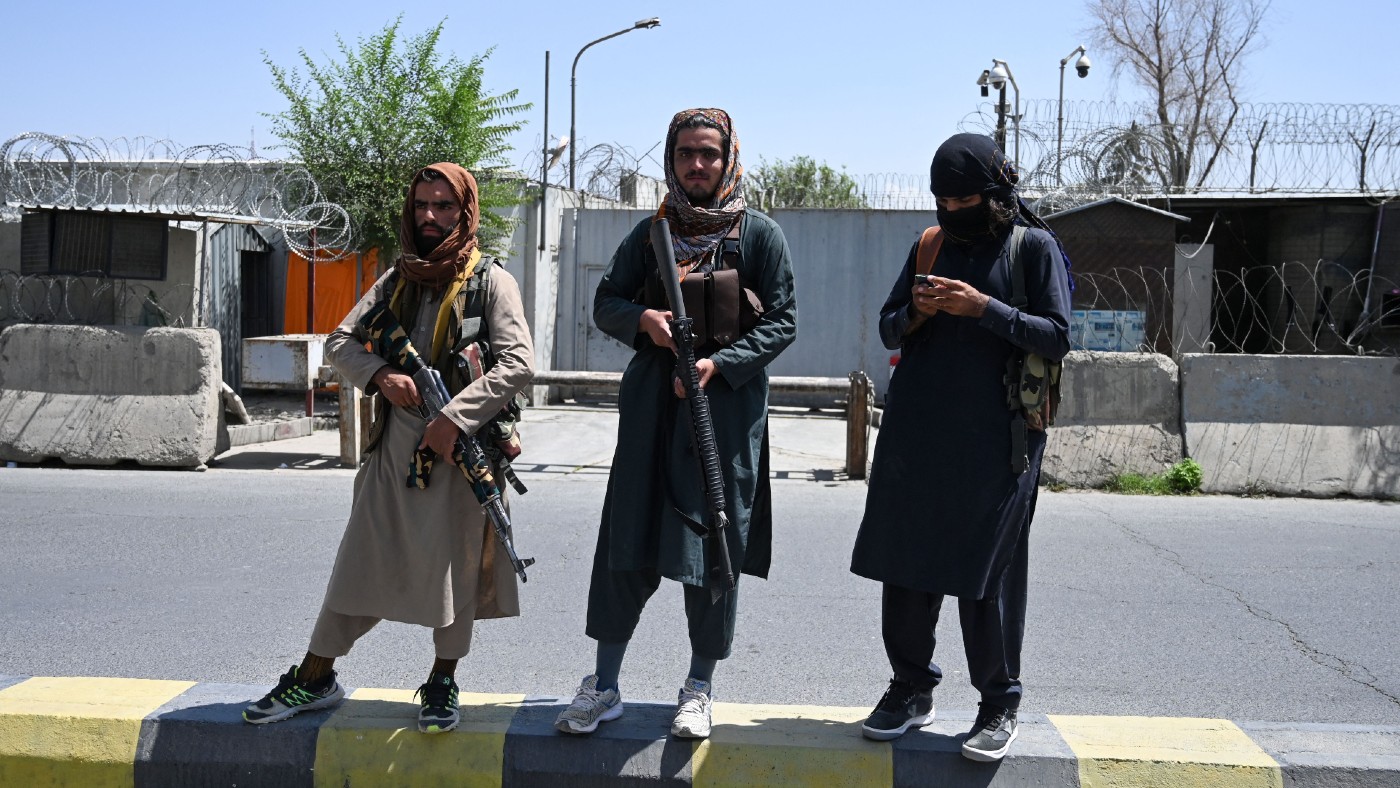The return of the Taliban
The Taliban’s swift capture of Kabul has resulted in panicked scenes in the capital

A free daily email with the biggest news stories of the day – and the best features from TheWeek.com
You are now subscribed
Your newsletter sign-up was successful
The speed of events in Afghanistan has “stunned the world”, said Ido Vock in the New Statesman. Many had predicted that the Taliban, despite its inferiority in numbers (80,000 militants against 300,000 US-trained Afghan soldiers), would eventually take control of much of the country. But few expected it to happen before the US had even completed its troop withdrawal on 31 August. On Sunday, the Taliban ended a week of lightning advances across the country by claiming control of the capital, Kabul, hours after President Ashraf Ghani had fled abroad. The insurgents’ victory led to panicked scenes in the city, said Emma Graham-Harrison in The Guardian. Thousands of people descended on the airport, where several died while trying to cling to departing planes. Western embassies set about hastily evacuating staff and destroying documents. Many women, meanwhile, rushed to buy burqas or to go into hiding.
President Biden admitted that the Taliban victory had come much quicker than anticipated, but said he stood “squarely behind” the decision to pull out. He blamed the swift collapse of the Afghan government on the unwillingness of the country’s army to stand and fight in the face of the Taliban advance. For its part, the Taliban, in its first press conference this week, sought to reassure opponents that it would be a responsible government. “We don’t want any internal or external enemies,” said the group’s main spokesman, Zabihullah Mujahid. He insisted that no retribution would be sought against those who worked for the former government, and that women would enjoy full rights “within the framework of Islam”. Today’s Taliban, he said, was very different to the one of 20 years ago.
That’s not what people on the ground are reporting, said Borzou Daragahi in The Independent. Afghans who fled to Kabul from areas previously captured by the Taliban have reported “massacres of civilians, summary executions of captured soldiers, and demands that unmarried women be handed over to fighters as spoils of war”. The Taliban’s promise of a new “open, inclusive Islamic government” is hard to take seriously, agreed Suzanne Moore in The Daily Telegraph. When it last held power, between 1996 and 2001, it ran a brutal regime that treated women as “less than human”. The US invasion changed that. The share of girls attending secondary school rose from 6% in 2003 to 39% in 2017, by which time there were 100,000 female students at university. Between 2001 and 2017, women’s life expectancy increased from 56 to 66. About 20% of civil servants are women. All those gains are now at risk owing to the West’s abandonment of the Afghans.
The Week
Escape your echo chamber. Get the facts behind the news, plus analysis from multiple perspectives.

Sign up for The Week's Free Newsletters
From our morning news briefing to a weekly Good News Newsletter, get the best of The Week delivered directly to your inbox.
From our morning news briefing to a weekly Good News Newsletter, get the best of The Week delivered directly to your inbox.

“The script for Afghanistan now is all too predictable,” said The Independent. Women’s rights will be erased and the country will once again become a base for terror groups, as it was in the 1990s (when an estimated 20,000 recruits from around the world passed through al-Qa’eda training camps there). The US is hoping the Taliban will be deterred from harbouring terrorists by the prospect of punitive bombing raids, but that didn’t work before. The Taliban refused to hand over Osama bin Laden even after those huge “daisy cutter” bombs were dropped on the Tora Bora mountains in 2001. The terror threat has certainly increased, said Shabnam Nasimi in The Daily Telegraph. Thousands of extremists were set free from prison during the Taliban advance, including the 5,000 “highest value” Taliban, al-Qa’eda and Islamic State fighters held at Bagram air base. “They are vanishingly unlikely to be preparing to go back to their families.”
There’s little evidence that the Taliban has changed its hardline views over the past 20 years, said Raffaello Pantucci in The Telegraph, but it has become a little more pragmatic. It’s aware that it’s taking over a changed Afghanistan. When the group last took power in 1996, it was offering a sense of basic justice to a country racked by “rampant warlordism”. The nation is in a better state today, and the Taliban will be judged harshly if it lets things slip back. To continue rebuilding, it will also require more aid and support from the West. The Taliban does seem to be adopting more moderate policies in the hope of securing local and international legitimacy, agreed Aris Roussinos on UnHerd. The group has assured Shia Muslims that they’ll be allowed to worship openly, and has appointed an ethnic Hazara governor for the Shia ethnic Hazara Bamiyan region. Whether it sticks with this approach or reverts to “totalitarian excess”, the fate of Afghanistan is now out of the West’s hands.
A free daily email with the biggest news stories of the day – and the best features from TheWeek.com
-
 Properties of the week: pretty thatched cottages
Properties of the week: pretty thatched cottagesThe Week Recommends Featuring homes in West Sussex, Dorset and Suffolk
-
 The week’s best photos
The week’s best photosIn Pictures An explosive meal, a carnival of joy, and more
-
 The ‘ravenous’ demand for Cornish minerals
The ‘ravenous’ demand for Cornish mineralsUnder the Radar Growing need for critical minerals to power tech has intensified ‘appetite’ for lithium, which could be a ‘huge boon’ for local economy
-
 Corruption: The spy sheikh and the president
Corruption: The spy sheikh and the presidentFeature Trump is at the center of another scandal
-
 Putin’s shadow war
Putin’s shadow warFeature The Kremlin is waging a campaign of sabotage and subversion against Ukraine’s allies in the West
-
 The fall of the generals: China’s military purge
The fall of the generals: China’s military purgeIn the Spotlight Xi Jinping’s extraordinary removal of senior general proves that no-one is safe from anti-corruption drive that has investigated millions
-
 Epstein files topple law CEO, roil UK government
Epstein files topple law CEO, roil UK governmentSpeed Read Peter Mandelson, Britain’s former ambassador to the US, is caught up in the scandal
-
 Iran and US prepare to meet after skirmishes
Iran and US prepare to meet after skirmishesSpeed Read The incident comes amid heightened tensions in the Middle East
-
 Syria’s Kurds: abandoned by their US ally
Syria’s Kurds: abandoned by their US allyTalking Point Ahmed al-Sharaa’s lightning offensive against Syrian Kurdistan belies his promise to respect the country’s ethnic minorities
-
 Israel retrieves final hostage’s body from Gaza
Israel retrieves final hostage’s body from GazaSpeed Read The 24-year-old police officer was killed during the initial Hamas attack
-
 China’s Xi targets top general in growing purge
China’s Xi targets top general in growing purgeSpeed Read Zhang Youxia is being investigated over ‘grave violations’ of the law